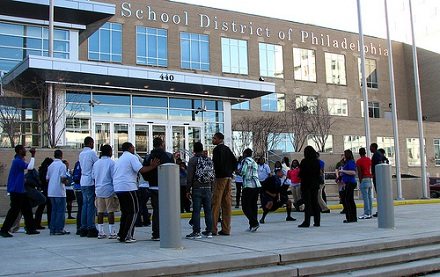
July 6, 2012; Source: Newsworks.org
It’s a fairly safe bet that a funder that gives $15 million to a struggling school system will draw attention, so it’s no surprise that the William Penn Foundation’s grant to the Philadelphia Schools Partnership received extensive media coverage from local and national sources last week. Elements of the story were covered by the Phladelphia City Paper, the Philadelphia Inquirer, Newsworks, and the Philadelphia Notebook (Newsworks and the Notebook, both nonprofit news organizations, note in their coverage that they receive grant funding from William Penn.)
Sign up for our free newsletters
Subscribe to NPQ's newsletters to have our top stories delivered directly to your inbox.
By signing up, you agree to our privacy policy and terms of use, and to receive messages from NPQ and our partners.
Not only is the William Penn Foundation a major Philadelphia funder with roots dating to 1945, president Jeremy Nowak told Newsworks that this latest grant is also “one of the largest grants” his organization has ever given. With a goal of aiding the Philadelphia Schools Partnership in fixing failing schools citywide—including public, charter, independent and Catholic—and spurring financial support from new sources, the grant has also raised new questions about the systemic changes that will result.
As background on the situation in Philadelphia, Mark Gleason, executive director of the Philadelphia School Partnership, told Newsworks.org, “Philadelphia had, as of about two years ago 50,000 students or about one quarter of the system in chronically-failing schools.” He added that the William Penn grant, which puts his organization closer to its overall $100 million goal, aims to get all city students out of failing schools within the next five years. Compounding the problem of failing schools is the public school system’s budget shortfall, which according to the Notebook, could reach $282 million for the 2012-2013 school year.
William Penn’s support for the Philadelphia Schools Partnership has highlighted two issues for local residents and education analysts: How will the overall structure of the school system change? And will it lead to new funding sources? In a May interview that focused on a recent study of the school system by the Boston Consulting Group—and funded by William Penn—the Notebook asked William Penn’s Nowak if he agreed with critics who say that “this plan means the dissolution of the School District as we know it?” Nowak’s response was “no,” and he added that city leaders are “looking at what works well in many high-performing schools (District-run and charter-operated) and determining the most effective and efficient way to offer those options to more students.”
Still others wonder about the feasibilty of the plan given the system’s chronic problems. Gerald Wright, a member of the group Parents United for Public Education told Newsworks, “I’m not sure if the School District of Philadelphia is able right now to appeal to private funders, mostly because I think they have not talked about the schools that have had the greatest level of success in the District and those schools unfortunately seem to fly below the radar.”—Anne Eigeman













